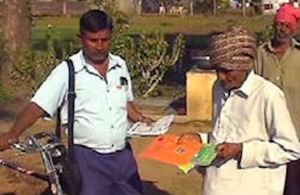DFID Research: Integrated approaches halve pesticide use
An integrated pest management strategy provides new ways to control a major pest of aubergines.

A postman delivers leaflets on eggplant borer control to a farmer. Picture: AVRDC
DFID-funded scientists have developed a new integrated approach to controling the eggplant fruit and shoot borer (Leucinodes orbonalis), an important insect pest of aubergines. Research by the World Vegetable Center (AVRDC) has dramatically reduced pesticide use on the crop in Bangladesh and India using a four-pronged control programme and effective wide-scale publicity and promotion of research findings.
No single approach to controlling the pest has been enough in the past. The boring moth larvae are only vulnerable to spraying for a few hours after hatching, and repeated sprays are necessary. Reports of over 80 spray applications in a growing season appear common, and rates of over 140 applications have been reported in some regions, leading to pollution of the environment and potential damage to the health of farmers and consumers. Borers have developed resistance to some chemicals, leading many farmers to create mixtures of numerous pesticides. Chemicals are also expensive, making aubergines costly to produce.
AVRDC scientists developed a simple four-point integrated strategy for control to tackle the borers:
- cultural pest control by prompt cutting and removal of pest-damaged shoots. Cutting off damaged shoots reduces pest damaged fruit, and is particularly effective when combined with use of nets to keep out adult moths
- development of borer-resistant varieties. A resistant cultivar of aubergines EG058 was used to produce borer-resistant plants in some countries
- promotion of the use of locally available natural enemies. A natural parasite of borer larvae is the wasp Trathala flavo-orbalis. However, it can only get to work when the use of insecticides is reduced or phased out
- sex pheromones are used to trap male moths. The sex pheromone used was the least expensive pheromone ever to be commercially produced. It is highly effective and economical compared to insecticides, and has been widely commercialised In the pilot projects, ‘field days’ were planned so that researchers could meet farmers and community leaders, building buy-in to the project from an early stage, and allowing farmers to participate in and influence project design and roll-out.
These original studies reached around 10,000 farmers, but so successful were the initial trials that nationwide promotion campaigns were carried out, planned by the researchers, agricultural institutes, NGOs and extension agencies. Television documentaries and radio interviews were carried in national news media channels in both Bangladesh and India, and promotion in the press and at a local level via a leafleting campaign and a programme of puppet shows helped reach more local communities and poor farmers.
According to Mohammad Alauddin, an official of the Bagherpara Agricultural Extension Department in Bangladesh, the reduction in pesticide usage seen in the study along with the take-up of the sex-pheromone has been “nothing short of a revolution”. The adoption of the integrated pest management strategy by farmers has been seen to frequently result in a doubling of profit margins, and has reduced pesticide usage by one half to three-quarters.
More information
The control strategy and its implementation was carried out by DFID-funded scientists at AVRDC working on the following projects (see the linked R4D project records for more details):